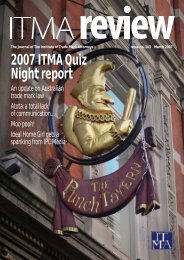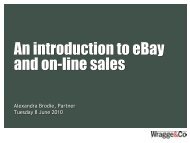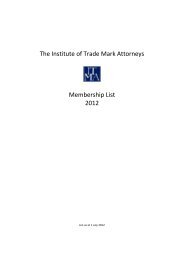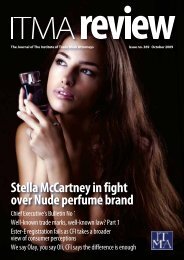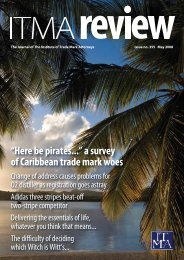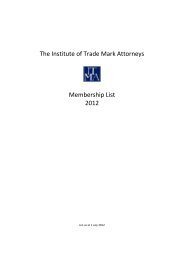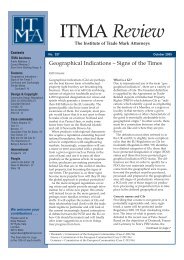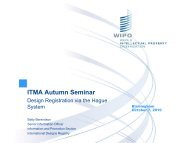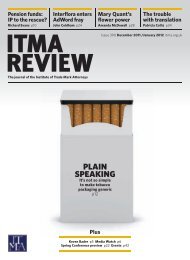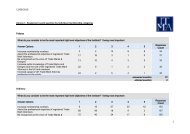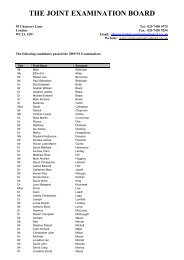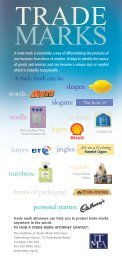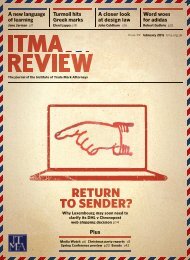ITMA 322 APRIL 2005
ITMA 322 APRIL 2005
ITMA 322 APRIL 2005
Create successful ePaper yourself
Turn your PDF publications into a flip-book with our unique Google optimized e-Paper software.
Case comments<br />
On Your Bikes<br />
In the matter of application no 2315408 by Professional Cycle Manufacturing Limited and in the matter of<br />
opposition no 92249 thereto by Halfords Limited, 31 August <strong>2005</strong>, Richard Arnold QC<br />
Professional Cycle Manufacturing Ltd (the applicants)<br />
applied for registration on 9 November 2002 of their<br />
trade mark EXCEL in Class 12 for “bicycles”. The UK<br />
Registry cited the trade mark APOLLO EXCEL<br />
against the applicants’ mark, which was registered for<br />
“bicycles; tricycles; parts and fittings for all of the<br />
aforesaid goods” in class 12. The applicants had overcome<br />
the objection on the basis of honest concurrent<br />
use of the mark.<br />
Halfords Ltd (the opponents) opposed the applicants’<br />
mark under section 5(2)(b) 1 for their own mark<br />
APOLLO EXCEL and also with respect to another<br />
CTM registration for EXEL in Classes 7, 8 and 12<br />
(“land vehicles”), owned by Exel SA, a French company,<br />
which is not related to the opponents.<br />
The hearing officer found that the applicants’ mark<br />
was similar to the opponents’ registration and upheld<br />
the ground of opposition under section 5(2)(b).<br />
Regarding the EXEL trade mark, the hearing officer<br />
stated that a mark which was not cited during the<br />
examination couldn’t be used to oppose except by its<br />
proprietors. The applicants and the opponents<br />
appealed against this decision.<br />
In the appeal, the Appointed Person held that the<br />
marks were not in concurrent use during the relevant<br />
period and there is a likelihood of confusion in the<br />
minds of the relevant public. Allowing the opponents’<br />
appeal, it was also held that there is a likelihood of<br />
confusion between the applicants’ mark and the EXEL<br />
trade mark.<br />
Arguments before the hearing officer<br />
The opponents had argued before the hearing officer<br />
that the applicants’ mark EXCEL was confusingly<br />
similar to their trade mark APOLLO EXCEL and to<br />
the EXEL trade mark of Exel SA. In response to the<br />
argument by the applicants that the opponents had<br />
not shown any evidence of confusion, the opponents<br />
responded that the absence of evidence of actual confusion<br />
was immaterial since the test was one of normal<br />
and fair use.<br />
The applicants contended that the opponents had<br />
not filed evidence to justify its entitlement to base its<br />
opposition on CTM registration of EXEL trade mark.<br />
They also argued that their mark and the opponents’<br />
mark would give rise to any confusion in the market.<br />
The applicants relied on CODAS Trade Mark [2001]<br />
RPC 14 and argued that the absence of evidence of<br />
confusion despite a lengthy period of honest concurrent<br />
use by the applicant showed that there was no<br />
likelihood of confusion.<br />
During the hearing, the hearing officer had drawn<br />
the attention of the opponents’ solicitors to the commentary<br />
on section 7(2) 2 FOOTNOTE in paragraph 8-<br />
115 of Kerly’s Law of Trade Marks (13th ed), which<br />
states:<br />
“Curiously section 7(2) refers only to an opposition<br />
by the proprietor of the earlier trade mark or other<br />
earlier right. On the words of the section it appears<br />
that if an opposition is entered by a party other than<br />
the proprietor of the earlier trade mark or other earlier<br />
right and such a party relies upon that earlier trade<br />
mark or other earlier right, as he is entitled to, then<br />
the Registrar must take into account honest concurrent<br />
use and, in an appropriate case, allow the mark<br />
to proceed to registration. That party would then<br />
have to bring an application for a declaration under<br />
section 47 following registration. It is hard to reconcile<br />
this with the mandatory words of Article 4 of the TM<br />
Directive.”<br />
The opponents’ solicitors responded that they<br />
would concentrate on their trade mark and when the<br />
hearing officer asked if they want to withdraw the<br />
opposition under the EXEL mark, they replied that it<br />
would appear necessary to do so. However, the opponents’<br />
solicitors wrote to the hearing officer after the<br />
hearing that they could rely upon EXEL registration,<br />
because the examiner did not raise this mark as a citation<br />
against the applicants’ mark, and the said mark<br />
has not been overcome on the grounds of honest concurrent<br />
use and section 7(2) does not apply to the said<br />
mark. The opponents’ solicitors requested the hearing<br />
officer to reconsider the matter and give them an<br />
opportunity to address the issue.<br />
Continued on page 16<br />
1 A trade mark shall not be registered if because it is similar to an earlier trade mark and is to be registered for<br />
goods or services identical with or similar to those for which the earlier mark is protected, there exists a likelihood<br />
of confusion on the part of the public, which includes the likelihood of association with the earlier trade<br />
mark.<br />
2 Section 7 (1) This section applies where on an application for the registration of a trade mark it appears to the<br />
registrar<br />
(a) that there is an earlier trade mark in relation to which the conditions set out in section 5(1), (2) or (3) obtain, or<br />
(b) that there is an earlier right in relation to which the condition set out in section 5(4) is satisfied,<br />
but the applicant shows to the satisfaction of the registrar that there has been honest concurrent use of the trade<br />
mark for which registration is sought.<br />
(2) In that case the registrar shall not refuse the application by reason of the earlier trade mark or other earlier<br />
right unless objection on that ground is raised in opposition proceedings by the proprietor of that earlier trade<br />
mark or other earlier right.<br />
December <strong>2005</strong> <strong>ITMA</strong> Review 15



